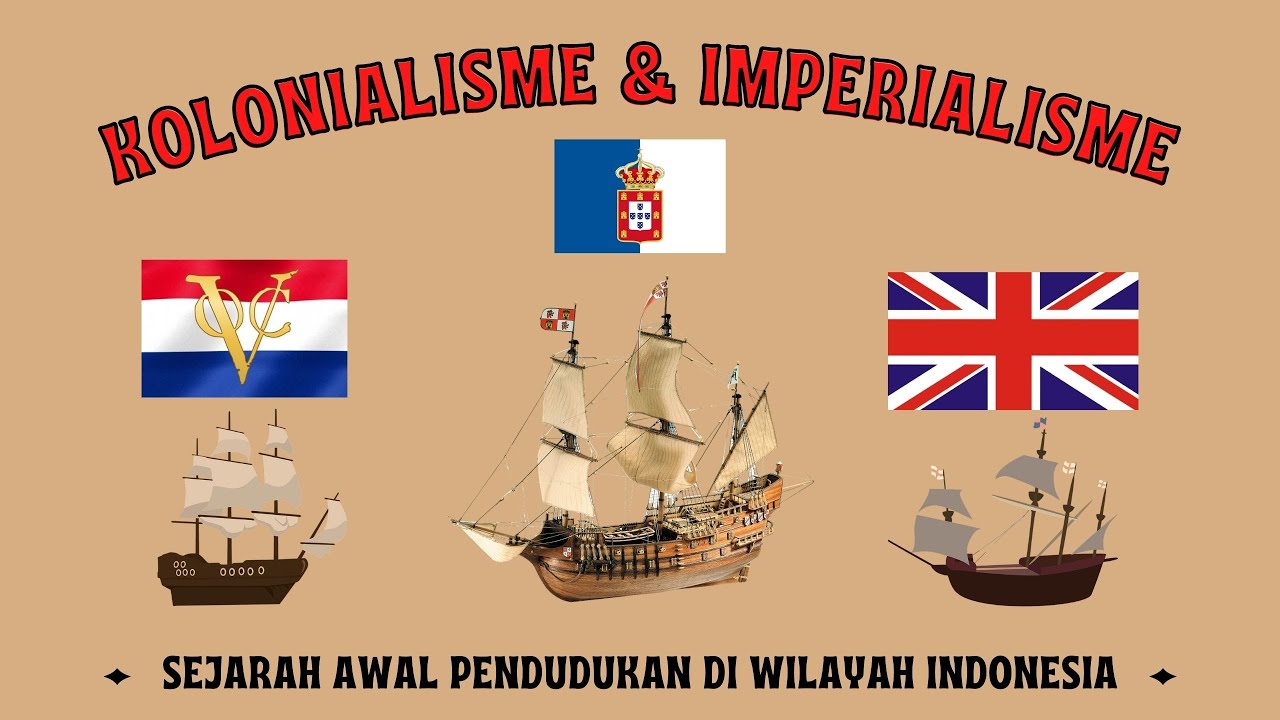Ang Kolonyalismo at Imperyalismong Kanluranin sa Pangkapuluang Timog Silangang Asya Q2 W3-4 (Part2)
Summary
TLDRThe transcript outlines the impact of Western colonialism and imperialism in Southeast Asia, focusing on the Spice Islands, particularly Indonesia and Malaysia. It details how the Portuguese, Dutch, and British sought control over trade routes and local resources, employing tactics like divide and rule. The Dutch East India Company monopolized the spice trade through the cultivation system, which imposed harsh agricultural demands on local Indonesians. Meanwhile, British colonial rule in Malaysia led to social strife between Chinese immigrants and native Malays. This complex history highlights the significant economic and cultural consequences of colonial pursuits in the region.
Takeaways
- 🌍 The Spice Islands, known for their valuable spices, attracted Western colonial powers for control and trade.
- 🇵🇹 The Portuguese reached Ternate in 1511, establishing trade posts and spreading Christianity in the region.
- 🇳🇱 The Dutch expelled the Portuguese and took control of the Spice Islands, employing military strength to assert dominance.
- ⚔️ The Dutch used a 'divide and rule' strategy to manipulate local leaders and maintain control over the islands.
- 💼 The establishment of the Dutch East India Company in 1602 unified Dutch trading efforts in Asia and allowed for military defense and local governance.
- 📈 The Dutch East India Company monopolized the spice trade, significantly enriching the Netherlands.
- 💰 The British temporarily seized control of the Spice Islands during the Napoleonic Wars but returned them to Dutch rule afterward.
- 🌱 The Dutch implemented the Cultivation System, forcing Indonesian farmers to allocate part of their land for cash crops like coffee and indigo.
- 🚜 The cultivation policies led to severe hardship for Indonesian farmers, as they could not grow food for their own needs.
- 🇲🇾 Colonial powers, including Portugal, the Netherlands, and England, similarly impacted Malaysia, primarily focusing on trade control and economic exploitation.
Q & A
What motivated Western powers to colonize Southeast Asia, specifically the Spice Islands?
-Western powers were primarily motivated by the desire to control the lucrative spice trade and the rich agricultural products of the region.
How did the Portuguese first establish their presence in the Spice Islands?
-The Portuguese established their presence in the Spice Islands by reaching Ternate in 1511 and setting up a trading post to spread Christianity and control spice trade.
What strategy did the Dutch use to gain control over the Spice Islands?
-The Dutch used a combination of military strength and alliances with local leaders, employing a 'divide and rule' policy to consolidate their control over the islands.
What was the role of the Dutch East India Company in the region?
-The Dutch East India Company, established in 1602, played a crucial role in monopolizing the spice trade, enabling the Netherlands to amass wealth and control over Southeast Asia.
What was the culture system implemented by the Dutch in Indonesia?
-The culture system required Indonesian farmers to allocate a portion of their land and time for the cultivation of export crops like coffee and indigo, causing significant hardship for the local population.
How did the British influence the demographic changes in Malaysia?
-The British encouraged Chinese migration to Malaysia as laborers for rubber plantations, leading to a population shift where Chinese outnumbered the indigenous Malays.
What were the consequences of colonial rule for the local populations in both Indonesia and Malaysia?
-Colonial rule led to economic exploitation, social tensions, and lasting hardships for local populations, including conflicts between indigenous groups and immigrant communities.
What challenges did the Portuguese face in spreading Christianity in Malaysia?
-The Portuguese faced strong Islamic influence in the region, which hindered their efforts to propagate Christianity effectively.
What temporary shift occurred in control of the Spice Islands during the Napoleonic Wars?
-During the Napoleonic Wars, England briefly gained control of the Spice Islands from the Dutch, but control reverted back to the Dutch after the conflict.
How did the colonial policies in Indonesia and Malaysia differ?
-While both regions experienced exploitation and hardship, Indonesia faced enforced agricultural policies like the culture system, whereas Malaysia saw demographic changes driven by labor migration due to British colonial interests.
Outlines

Esta sección está disponible solo para usuarios con suscripción. Por favor, mejora tu plan para acceder a esta parte.
Mejorar ahoraMindmap

Esta sección está disponible solo para usuarios con suscripción. Por favor, mejora tu plan para acceder a esta parte.
Mejorar ahoraKeywords

Esta sección está disponible solo para usuarios con suscripción. Por favor, mejora tu plan para acceder a esta parte.
Mejorar ahoraHighlights

Esta sección está disponible solo para usuarios con suscripción. Por favor, mejora tu plan para acceder a esta parte.
Mejorar ahoraTranscripts

Esta sección está disponible solo para usuarios con suscripción. Por favor, mejora tu plan para acceder a esta parte.
Mejorar ahoraVer Más Videos Relacionados

MATATAG AP7 Q2 W3 Ang Imperyalismong Kanluranin sa Pangkapuluang TSA with PPT Link

Ang Kolonyalismo at Imperyalismong Kanluranin sa Pangkapuluang Timog Silangang Asya Q2 W3-4 (Part 1)

SEJARAH KOLONIALISME & IMPERIALISME DI INDONESIA

INI ALASAN BANGSA EROPA MENJAJAH

The History of "Ganyang Malaysia" Part 2 | The Confrontation Ends

Konsepto ng Kolonyalismo at Imperyalismo AP7 Q2 Week 1-2 (Part 1) #depedmatatag
5.0 / 5 (0 votes)
